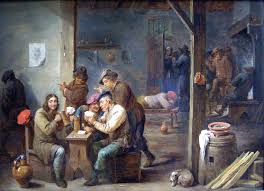记忆方法
他问。借问酒家何处有——小酒店;旅店。
中文词源
tavern 酒馆,旅店
来自古法语 taverna,酒馆,旅店,来自拉丁语 taberna,帐篷,酒馆,旅店,异化自*traberna, 屋梁,柱子,来自 PIE*treb,居住,聚居,屋梁,词源同 trave,thorp,troop.拼写比较 tornado, 来自西班牙语 tronada,异化自拉丁语 tonare,词源同 thunder.
英语词源
- tavern
-
tavern: [13] Tavern comes via Old French taverne from Latin taberna ‘hut, inn’, a word possibly of Etruscan origin. Derived from taberna, in the sense ‘hut’, was the diminutive form tabernāculum ‘tent’, which was borrowed into English as tabernacle [13]. Its original application was to the tent which according to the Bible covered the Ark of the Covenant.
=> tabernacle - tavern (n.)
- late 13c., "wine shop," later "public house" (mid-15c.), from Old French taverne (mid-13c.) "shed made of boards, booth, stall," also "tavern, inn," from Latin taberna "shop, inn, tavern," originally "hut, shed, rude dwelling," possibly [Klein] by dissimilation from *traberna, from trabs (genitive trabis) "beam, timber," from PIE *treb- "dwelling" (cognates: Lithuanian troba "a building," Old Welsh treb "house, dwelling," Welsh tref "a dwelling," Irish treb "residence," Old English ðorp "village, hamlet, farm, estate").
权威例句
- 1. There is a tavern at the corner of the street.
- 街道的拐角处有一家酒馆.
- 2. Philip always went to the tavern, with a sense of pleasure.
- 菲利浦总是心情愉快地来到这家酒菜馆.
- 3. First he stopped at a tavern for a biteand a sup.
- 他首先找了个酒馆歇歇脚、吃点什么.
- 4. I was standing near a tavern door.
- 我正站在一家酒店门口.
- 5. He stayed pretty long in the tavern.
- 他在酒店里呆了很久.
